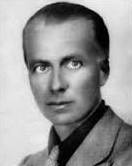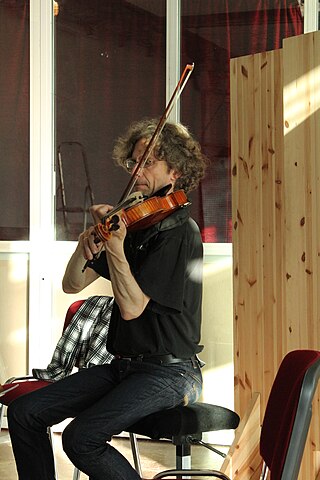Related Research Articles

Giacinto Francesco Maria Scelsi was an Italian composer who also wrote surrealist poetry in French.
The doctrine of the affections, also known as the doctrine of affects, doctrine of the passions, theory of the affects, or by the German term Affektenlehre was a theory in the aesthetics of painting, music, and theatre, widely used in the Baroque era (1600–1750). Literary theorists of that age, by contrast, rarely discussed the details of what was called "pathetic composition", taking it for granted that a poet should be required to "wake the soul by tender strokes of art". The doctrine was derived from ancient theories of rhetoric and oratory. Some pieces or movements of music express one Affekt throughout; however, a skillful composer like Johann Sebastian Bach could express different affects within a movement.
Franco Evangelisti was an Italian composer specifically interested in the scientific theories behind sound.
Claus-Steffen Mahnkopf is a German composer, editor and author.
The Hochschule für Musik Mainz is a university of music, part of the Johannes Gutenberg University of Mainz. It is the only such institution in the German state of Rhineland-Palatinate.
Hans Jantzen was a German art historian who specialized in Medieval art.

Vincent Royer is a French violist and composer.
Hans Heinrich Eggebrecht was a German musicologist and professor of historical musicology at the Albert-Ludwigs-Universität in Freiburg.

Wilhelm Klatte was a German music theoretician, pedagogue, journalist and conductor.
Konrad Küster is a German musicologist.
Bodo Alexander Bischoff is a German musicologist and Choral conductor.
Hermann Danuser is a Swiss-German musicologist.
Hans Joachim Marx is a German music historian. He has been professor of European music history at the University of Hamburg.

Peter Wicke is a German musicologist, who is particularly interested in popular music; he teaches as a university professor at Humboldt-Universität zu Berlin.
Albrecht von Massow is a German musicologist. Since 2000 he has held a professorship for 20th century music and systematic musicology at the joint Institute for Musicology Weimar-Jena.
Ludwig Holtmeier is a German music theorist and piano player.
Eckehard Kiem was a German music theorist, university professor and composer.
Armin Suppan is an Austrian brass musician and composer.
Wolf Frobenius was a German musicologist and lecturer, who taught at the Saarland University.
References
- ↑ PAX : Analyse bei Giacinto Scelsi: "Tre canti sacri" und "Konx-Om-Pax" on WorldCat
- ↑ Kontrapunkt I: Die Musik der Renaissance on WorldCat
- ↑ Kontrapunkt II die Musik des Barock on WorldCat
- ↑ Schlüsselwerke der Musik on WorldCat
- ↑ on WorldCat